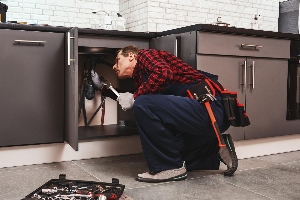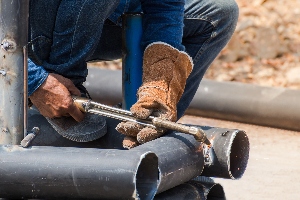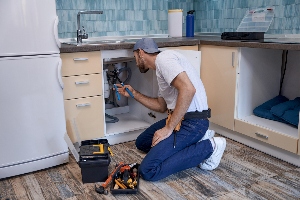Clogged drains become more common during the colder months as cold temperatures cause pipes to contract, making them more prone to clogs from debris and buildup. Grease and fats solidify faster in cold water, sticking to pipe walls, while hair, soap scum, and other waste also accumulate more easily.
You can prevent winter drain clogs such as running hot water down drains regularly to melt buildup. Additionally, use drain screens to catch hair and debris and avoid pouring grease down sinks. If clogs occur, try a plunger or drain snake before calling a plumber.
Understanding the Winter Effect on Plumbing
Cold temperatures can cause pipes to freeze and expand, while indoor activities increase strain on drains. These factors combine to make clogs more likely during colder months.
Expansion and Contraction
When water freezes, it expands, applying pressure to pipes which can lead to cracks or bursts. This expansion can also weaken joints and seals over time.
Metal pipes are more prone to this issue than plastic ones and copper pipes, for example, can expand up to 1 inch per 100 feet of pipe when heated. This expansion and contraction cycle can cause pipes to shift, potentially creating leaks or weak spots.
To protect your pipes, insulate them properly, focusing on areas near exterior walls or in unheated spaces like attics and crawl spaces. Use foam pipe insulation or heat tape for added protection.
Frozen Pipes and Drainage Issues
When water freezes in pipes, it blocks the flow and can cause backups or bursts. This is especially common in outdoor pipes or those in unheated areas.
Signs of frozen pipes include:
- No water coming from faucets
- Frost on exposed pipes
- Strange smells from drains
To prevent frozen pipes:
- Keep your home heated, even when you're away
- Let faucets drip in very cold weather
- Open cabinet doors to let warm air reach pipes under sinks
If you suspect a frozen pipe, call a plumber right away as quick action can prevent serious damage to your plumbing system.
Increased Indoor Activities
Winter keeps people indoors more, which puts extra stress on your plumbing system. More cooking means more grease and food scraps going down drains, while holiday guests increase water usage and toilet flushes.
This higher usage can lead to more clogs as greasy foods like gravy or butter can solidify in cold pipes, creating blockages. Hair and soap scum also build up faster with more showers and baths.
To reduce winter clogs:
- Scrape plates before washing
- Use a hair catcher in showers
- Flush only toilet paper and human waste
Common Culprits Behind Clogged Drains
Drains often clog due to everyday items and substances that build up over time. Knowing the main causes can help you prevent and address clogs more effectively.
Hair and Soap Residue
Hair is a major drain clogger, especially in showers and bathroom sinks. It gets tangled and traps other debris, forming stubborn clumps. Soap scum adds to this problem by sticking to hair and pipe walls.
To prevent hair clogs, use drain covers in showers and sinks and clean these covers often to remove trapped hair. You should also brush your hair before showering to catch loose strands.
Soap residue builds up slowly but steadily, mixing with minerals in water to create a sticky film inside pipes. Use liquid soaps instead of bar soaps to reduce this buildup and clean your drains monthly with a mix of baking soda and vinegar to break down soap scum.
Grease and Oil Buildup
Kitchen sinks often clog because of grease and oil sticking to pipe walls when they cool down. Over time, they catch food particles and create thick blockages.
To avoid this, never pour cooking oil or grease down your drain. Instead, let it cool and throw it in the trash, wiping greasy pans with paper towels before washing.
Use cold water when running your garbage disposal as this helps solidify grease so it can be chopped up instead of coating pipes. Pour a mix of dish soap and hot water down the drain weekly to help break down any grease buildup.
Foreign Objects and Tree Roots
Small items often fall into drains by accident and common culprits include jewelry, toys, and bits of food. Use sink stoppers to catch small objects and be careful what you put down the drain, taking the time to teach children not to flush toys or other items.
For outdoor pipes, check if any large trees are near sewer lines, and have your lines checked every few years for root intrusion. If you have recurring problems, consider removing trees near sewer lines or using root barriers.
Effective Drain Maintenance and Prevention
Keeping your drains clear and functioning properly requires regular upkeep and smart habits. These simple steps can prevent clogs and costly repairs.
Regular Cleaning and Inspection
Clean your drains monthly with a mix of baking soda and vinegar. Pour 1/2 cup baking soda down the drain, followed by 1/2 cup vinegar. Let it fizz for 15 minutes, then flush with hot water.
Check your drains often for slow water flow as this can signal a developing clog. Use a plumber's snake to remove minor blockages before they worsen.
Meanwhile, in winter, keep an eye on exposed pipes and insulate them to prevent freezing which can lead to clogs and bursts.
Proper Disposal Habits
Never pour grease or oil down your drains as these substances solidify and cause major blockages. Instead, let them cool and throw them in the trash. You should also use a mesh strainer in your kitchen sink to catch food scraps and empty them into the garbage regularly.
In the bathroom, Install drain covers in all sinks, showers, and tubs as these catch hair, soap scum, and other debris before they enter your pipes. Flush only toilet paper down the toilet and be careful, "flushable" wipes often aren't as flushable as advertised.
Professional Interventions and DIY Solutions
Clogged drains in winter can be fixed through professional help or home remedies. The right approach depends on the severity of the clog and your comfort level with plumbing tasks.
When to Call a Plumber
Serious clogs often need expert help and you should call a plumber if:
- Your drain hasn't improved after trying DIY methods
- Multiple drains are clogged at once
- You hear gurgling sounds from pipes
- Water backs up into other fixtures
Plumbers use specialized tools like video cameras and hydro-jets that can locate and clear tough blockages. Professional drain cleaning services can also prevent future clogs and are more effective than home remedies.
DIY Drain Cleaning Techniques
Try these simple methods for minor clogs:
- Plunger: Use it on sinks, tubs, and toilets. Create a tight seal and pump vigorously.
- Drain snake: Feed it into the drain to break up or pull out clogs.
- Baking soda and vinegar: Pour 1/2 cup baking soda followed by 1/2 cup vinegar down the drain. Wait 15 minutes, then flush with hot water.
- Boiling water: Pour it down the drain in stages to melt grease clogs.
The Use of Chemical Drain Cleaners
Chemical drain cleaners can be effective and easy to use but have drawbacks such as being harsh on pipes and fixtures, harmful to the environment, and can sometimes cause health risks if mishandled.
Use chemical cleaners sparingly and always follow package instructions carefully. Never mix different drain cleaners. If a chemical cleaner doesn't work, don't use more, instead, switch to a different method or call a plumber.
Speak to us today to arrange an inspection of your drainage system and to winterize your property as soon as possible.












